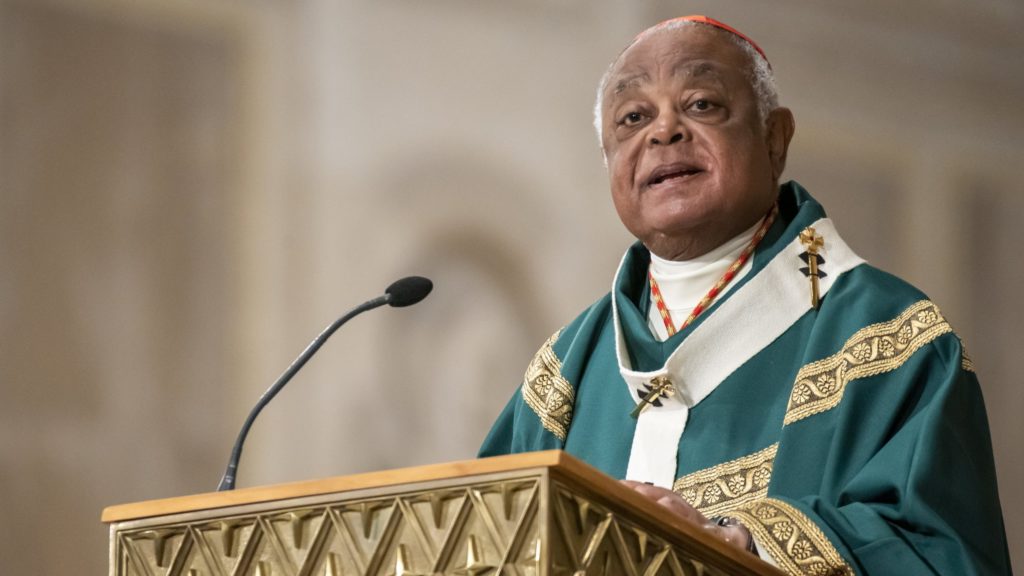Celebrating a Feb. 5 Mass in honor of Black History Month, Washington Cardinal Wilton D. Gregory urged "ordinary people of color" to "vastly improve our world with an understanding of the strength of character that resides within the souls of our people."
Referring to the day's Gospel reading from Matthew (5:13-16) in which Jesus refers to his disciples as the salt of the earth and the light of the world, Cardinal Gregory said, "We are chosen by none other than the Lord, the light of the world himself; we have no choice but to be an example to the world."
"Many have suffered martyrdom as the price of their witness and those who do become salt and light may become the subject of ridicule," the cardinal said. "But we need ordinary faith-filled people like yourselves to allow your lights to shine -- however small ... to illuminate the darkness of this world."
He reminded those at the Mass that "you are exactly the ones Christ called to be light in the world – not because of the great things you have done, but the generous things that you do."
Cardinal Gregory said. "That's your job. It comes from none other than Christ himself. You are the salt of the earth, you are the light of the world. There is no getting around it."
Cardinal Gregory was the principal celebrant of the annual Mass, which he called a "rousing and wonderful celebration." It was offered at Holy Comforter-St. Cyprian Church in Washington and sponsored by the Archdiocese of Washington's Office of Cultural Diversity and Outreach.
Several hundred people attended the Mass, which Cardinal Gregory said was "our largest gathering for Black History Month in a couple of years."
Concelebrants included Washington Auxiliary Bishop Roy E. Campbell Jr.; Msgr. Charles Pope, pastor of Holy Comforter-Saint Cyprian Parish; Father Michael Bryant, the longtime Catholic chaplain at the D.C. Detention Center; Franciscan Father Lalo Jara, program director of the archdiocese’s Office of Cultural Diversity and Outreach; Father Robert Boxie, Catholic chaplain at Howard University; and Father Patrick Aboagye, who is in residence at Holy Comforter-St. Cyprian Parish.
"They are here out of affection and great devotion to the African American community," Cardinal Gregory said of the bishop and priests concelebrating the Mass.
Black History Month traces its roots to 1926 when noted historian Carter G. Woodson and the Rev. Jesse E. Moorland established Negro History Week to highlight the achievements of African Americans and others of African descent. The second week of February was chosen to coincide with the birthdays of President Abraham Lincoln and abolitionist and author Frederick Douglass.
By the 1960s, Negro History Week had expanded to Black History Month on college campuses across the country. In 1976, President Gerald Ford officially recognized February as Black History Month to "honor the too-often neglected accomplishments of Black Americans in every area of endeavor throughout our history."
"African American History Month is not just about the past. It's not just about the great things that were done 50 years ago, 100 years ago, 200 years ago," Cardinal Gregory said. "It's about the future and what light will we shed to a world that is too gloomy and too covered with shadows."
Cardinal Gregory pointed out that there is a movement in the U.S. Congress to remove an exemption to the 13th Amendment to the Constitution that still exists that says if any former slaves are caught and convicted of a crime, they could be put back into slavery.
Urging the faithful to work for the removal of that exemption, Cardinal Gregory said, "None of us should ever be forced, no matter what we have done, back into slavery -- not just slavery with chains, but slavery of sin, slavery of fear, slavery of hatred."
"We are called to be free men and women," he stressed.
During the Mass, prayers also were offered for six African American Catholics who are candidates for sainthood sainthood candidates.
Three of the six have the title of "Venerable": Father Augustus Tolton, the first publicly known Black Catholic priest in the United States; Sister Henriette Delille, who founded the Congregation of the Sisters of the Holy Family; and Pierre Toussaint, a formerly enslaved philanthropist who supported many Catholic charitable works. And three have the title "Servant of God": Mother Mary Lange, the foundress and first superior general of the Oblate Sisters of Providence; Julia Greeley, who after her emancipation from enslavement joined the Secular Franciscan Order and promoted devotion to the Sacred Heart of Jesus; and Sister Thea Bowman, a Franciscan Sisters of Perpetual Adoration, who was a noted educator and evangelist. Raised in a Methodist home, she became a Catholic at age 9 with her Methodist parents' permission.
The "Servant of God" title is given to a sainthood candidate when a canonization cause is officially opened. "Venerable" is the declaration of the person's heroic virtues. In general, one miracle attributed to the intercession of a sainthood candidate is needed for beatification and a second such miracle is needed for canonization.
"May their extraordinary lives of faith, hope and love soon be recognized by the universal church so that this, and subsequent generations may be inspired to imitate their heroic virtue," the congregation prayed.

